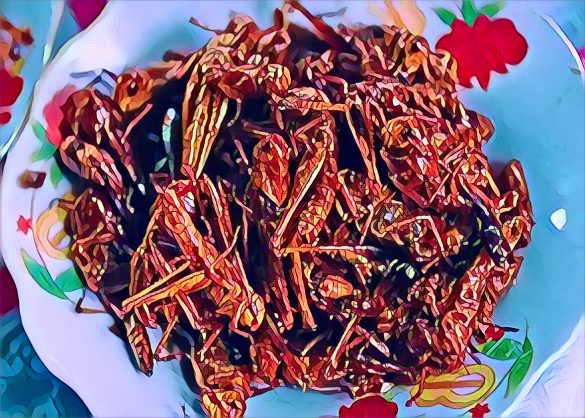In the face of an El Niño-induced drought that has devastated crops and left many in Zimbabwe’s rural communities hungry, swarms of locusts have emerged as an unlikely source of sustenance. Villagers, particularly children, have turned to catching these insects daily to feed their families, as the crisis deepens across the nation.
Early Saturday mornings see children like 10-year-old Ratidzo from Makanda homestead racing through maize fields with buckets and old mosquito nets. Their target: locusts, which are abundant but immobile due to the early morning frost. About 80 kilometers east of Karoi town, under Chief Mjinga in Hurungwe East, Ratidzo and others gather these insects as crucial dietary supplements. “This is part of our daily relish. We didn’t have enough maize due to drought,” Ratidzo shared.
The plight of these communities highlights the broader food security crisis in Zimbabwe, where President Emmerson Mnangagwa has declared the drought a national disaster. An estimated half of the country’s population now requires food aid, affecting both rural and urban areas alike.
Locusts, typically seen as pests, have become a vital resource for many. In Tengwe and around the farming town of Karoi, catching locusts is not just a survival strategy but increasingly a commercial venture. Tobias Murenga, a resettled farmer along the Karoi-Chirundu Highway, explained, “Selling locusts can make a difference because one can buy basic commodities including salt, sugar, soap, among others.”
Further north, about 65 kilometers from Karoi under Chief Kazangarare, villagers are capitalizing on another natural resource: wild fruits known locally as nhunguru, or governor plums. These fruits have become another source of income, with locals selling them in nearby towns.
The situation has drawn parallels to historical events where locusts have provided relief in times of drought. The Zimbabwe National Traditional Healers Association (Zinatha) recalls the 1946 and 1947 ‘year of locusts,’ when populations in Masvingo survived on another type of insect called harurwa. This historical precedent underscores the cyclical nature of such crises in Zimbabwe.
However, the current drought has severe social ramifications, particularly for women and children. Mashonaland West Proportional Representative legislator, Mutsa Murombedzi, emphasized the disproportionate impact on these groups. “Women and girls often bear the primary responsibility for food provision, water collection, and caring for family members, exacerbating their vulnerability during times of drought,” she said in a written response.
Murombedzi also highlighted the increased risks of gender-based violence and the economic challenges faced by women engaged in small-scale agriculture and informal income-generating activities. The drought has forced some children, especially girls, to drop out of school and engage in child labor, perpetuating poverty and limiting future opportunities.
To address these multifaceted challenges, Murombedzi advocates for a comprehensive adaptation approach. This includes sustainable water management, drought-resistant crops, improved irrigation systems, community-based early warning systems, and social safety nets to support the vulnerable. Importantly, she stresses the need for women to be involved in decision-making processes, enhancing their access to education and economic opportunities.
As Zimbabwe grapples with the effects of climate change, which has turned the former breadbasket of southern Africa into a region plagued by successive droughts, the resilience and ingenuity of its people come to the forefront. The adaptation strategies, community efforts, and reliance on natural resources like locusts and wild fruits are testament to the enduring spirit of Zimbabweans facing environmental adversities. Yet, the need for substantial external aid and effective government intervention remains critical as the nation seeks sustainable solutions to these recurring droughts and their far-reaching consequences.
Source: Newsday


